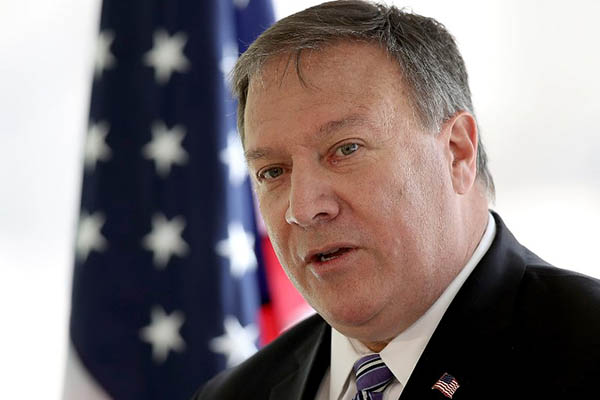
Win McNamee-Getty Images North America—AFP
Islamabad slams designation as ‘unilateral and politically motivated’ in rejoinder issued by Foreign Office
The United States on Tuesday added Pakistan to its blacklist of countries that violate religious freedom, ramping up pressure over Islamabad’s treatment of minorities.
Secretary of State Mike Pompeo said he had designated Pakistan among “countries of particular concern” in a congressionally mandated annual report, meaning the U.S. government is obliged to exert pressure, including imposing sanctions if necessary, to end freedom violations.
The State Department had earlier held off on condemning Pakistan, a vital gateway for U.S. forces in Afghanistan. But it last year placed Pakistan on a special watch list—a step short of the designation—and Washington has separately curbed military assistance.
Human rights advocates have long voiced alarm about the treatment of religious minorities in Pakistan, including Shia Muslims, Christians and Ahmadis, who are declared non-Muslim by Pakistani law. But the timing of the full designation comes after Pakistan moved to resolve its highest-profile case, with the Supreme Court in October ordering the release of Aasia Bibi—a Christian woman on death row for eight years for blasphemy.
Pakistan recently charged a hardline cleric, Khadim Hussain Rizvi, with terrorism and sedition after he led violent protests against Bibi’s acquittal.
Sam Brownback, the U.S. ambassador at large for religious freedom, voiced guarded hope for the direction under Prime Minister Imran Khan but said that Pakistan’s record remained dismal. Of “the world’s population of people that are in prison for blasphemy, half of them are in Pakistani prisons,” Brownback told reporters on a conference call, noting that Bibi was still awaiting release. “The government often fails to hold accountable perpetrators of killings and violence against members of religious minorities,” he said. “I hope that the new leadership in Pakistan will work to improve the situation. There are some encouraging signs seen recently.”
Islamabad, in a statement issued by the Foreign Office, dismissed Washington’s sanction, terming the move “unilateral and politically motivated.” In its rejoinder, the Foreign Office also questioned the “credentials and impartiality of the self-proclaimed jury involved in this unwarranted exercise.”
The statement also took aim at the apparent lack of concern about human rights in Kashmir, noting: “proponents of human rights worldwide close their eyes on the systematic persecution of minorities subjected to alien domination and foreign occupation such as in the occupied Jammu and Kashmir,” adding that the U.S. should conduct “an honest self-introspection” to learn “causes of the exponential rise in Islamophobia and anti-Semitism in the U.S.”
Nine countries remained for another year on the list of Countries of Particular Concern—China, Eritrea, Iran, Myanmar, North Korea, Saudi Arabia, Sudan, Tajikistan and Turkmenistan. The United States removed one country from the list—Uzbekistan—but kept it on the watch list. Brownback hailed the central Asian country for moving in the right direction, saying that religious liberty made countries less prone to terrorism.
Religious freedom has been a key priority for President Donald Trump, who was elected with strong support from evangelical Christians, even as he has openly downplayed the importance of human rights in dealing with close allies such as Saudi Arabia. “In far too many places across the globe, individuals continue to face harassment, arrests or even death for simply living their lives in accordance with their beliefs,” Pompeo said in a statement. “The United States will not stand by as spectators in the face of such oppression,” he said.
Pompeo also put on the watch list Russia, adding another item of contention to the relationship between the two powers.
Brownback said that Russia has “engaged and tolerated really severe violations of religious freedom” since it passed a 2016 law criminalizing unapproved missionary work. Citing NGO figures, Brownback said that Russia has targeted missionaries including Jehovah’s Witnesses and Mormons in 156 cases and that Russia is holding 145 people for their religious beliefs, most of them Muslims.
Brownback, a former governor of Kansas close to conservative Christians, voiced special alarm about the direction of China, where according to a United Nations report one million Uighurs are under detention in a sweeping crackdown on the predominantly Muslim ethnicity. Brownback called the treatment of Uighurs in the western Xinjiang region “one of the, just really, worst human rights situations in the world.”
He said that China appeared to be taking its tactics elsewhere and voiced worries for Tibetan Buddhists, practitioners of the Falungong spiritual movement and underground Christians, with a major unofficial Protestant church raided this week in Chengdu. “China isn’t backing away from religious persecution. It seems to be expanding. This is obviously very troubling to the administration,” Brownback said.
Also on the watch list was the Comoros, the Indian Ocean archipelago that is almost exclusively Sunni Muslim.
